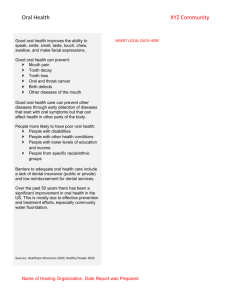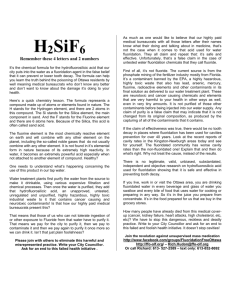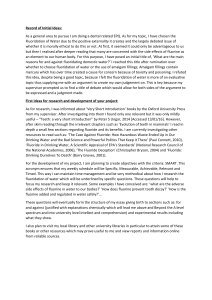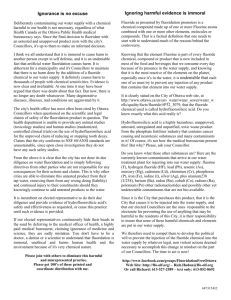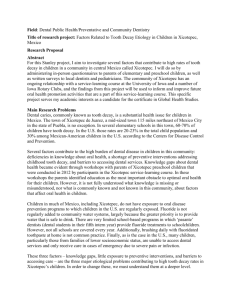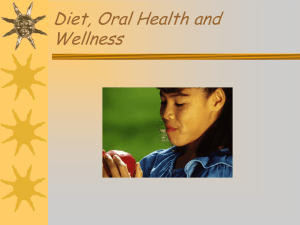File - Fluoride Information Network for Dentists
advertisement
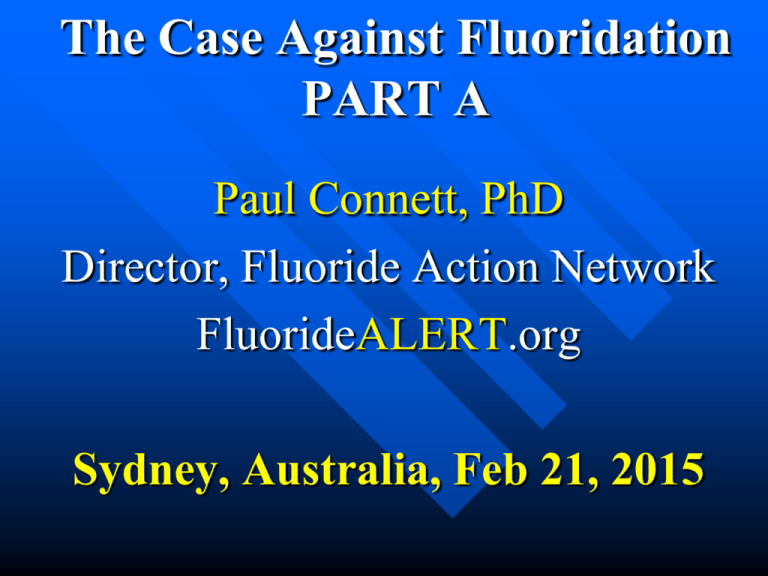
The Case Against Fluoridation PART A Paul Connett, PhD Director, Fluoride Action Network FluorideALERT.org Sydney, Australia, Feb 21, 2015 I have spent the last 19 years fighting water fluoridation first as a professor of chemistry specializing in environmental chemistry and toxicology, and now as director of the Fluoride Action Network. This research effort culminated in the publication of The Case Against Fluoride in Oct, 2010. James Beck, MD, PhD, A retired professor of Physics from Calgary HS Micklem, D Phil (Oxon) A retired professor of Biology from Edinbrgh Book published by Chelsea Green October, 2010 Can be ordered on Amazon.com Contains 80 pages of references to the Scientific literature After 5 years Fluoridation promoters have not produced a written scientific response to the arguments presented in this book Fluoridation has “fossilized” into a belief system I will argue that Fluoridation is 1) UNUSUAL 2) UNNATURAL 3) UNETHICAL 4) UNNECESSARY 5) UNSAFE 6) INEFFECTIVE and 7) There are better ways to fight tooth decay in low-income families Part 1. Better ways 7) There areofbetter fighting tooth decay ways of fighting tooth decay in low-income families A Better Strategy Most of the tooth decay today is concentrated in low-income families. We need to target those families with better dental services, better dental education and better diet. They have done this in Scotland Scotland Instead of water fluoridation, the Scottish Government instigated its ChildSmile program. This involves: a) teaching toothbrushing at nursery-school b) plus healthy snacks & drinks; c) plus health, dental hygiene and diet advice to their families; d) annual dental check-ups and treatment if required including fluoride varnish applications. Scotland The proportion of children aged 4–6 years without obvious dental decay has risen from 42% in 1996 to 67% in 2012. And for 10–12 years it rose from 53% in 2005 to 73% in 2013 (Information Services Division Scotland, 2013). Scotland “Glasgow researchers found that...the cost of treating dental disease in five-yearolds decreased by more than half between 2001 and 2010.” (BBC, Scotland) The message: our kids need MORE BRUSHING! MORE FRUIT AND VEGETABLES! LESS SUGAR! Less sugar means less tooth decay and less OBESITY Less obesity means less diabetes and fewer heart attacks In other words education to promote less sugar consumption is a very good investment! Part 1. Better ways of 1) Fluoridation fighting tooth decay is Unusual The vast majority of countries do NOT fluoridate their water 97% of Western European population now drinks Non-Fluoridated Water Austria Belgium Denmark Finland France Germany Greece Iceland Italy Luxembourg Netherlands Northern Ireland Norway Scotland Sweden Switzerland 97% of Western European population now drinks Non-Fluoridated Water Austria* Belgium Denmark Finland France* Germany* Greece Iceland Italy Luxembourg Netherlands Northern Ireland Norway Scotland Sweden Switzerland* *Some fluoridate their salt Part 1. Better ways of 2) Fluoridation fighting tooth decay is Unnatural Nature’s verdict: The level of fluoride in mothers’ milk is EXTREMELY LOW 0.004 ppm (NRC , 2006, p. 40) Mothers’ milk protects our babies from early exposure to fluoride F = 0.004 ppm Water fluoridation removes nature’s protection F = 1.00 ppm 250 x level in mothers’ milk A bottle-fed baby in a fluoridated community (0.7 – 1.2 ppm) is getting 175-300 times the fluoride dose that nature intended! In other words by Nature’s standards 1 ppm is not small it is HUGE! Please Note: Life evolved from the sea where the level of fluoride is about 1.4 ppm, BUT not one single process in the body requires fluoride to function! Fluoride is NOT an essential nutrient Please Note: Many biological processes and components are harmed by fluoride (enzymes, G-proteins etc) Part 1. Better ways of 3) Fluoridation fighting tooth decay is Unethical We should NEVER use the public water supply to deliver ANY medical treatment a) You can’t control the DOSE b) you can’t control who gets the treatment AND c) it violates the individual’s right to informed consent to medication Part 1. Better ways of 4) Fluoridation fighting tooth decay is Unnecessary In 1999, the CDC Oral Health Division (the #1 promoter of fluoridation in the world) conceded that the predominant benefit of fluoride is TOPICAL not SYSTEMIC. CDC, MMWR, 48(41); 933-940, Oct 22, 1999 “Fluoride’s caries-preventive properties initially were attributed to changes in enamel during tooth development... However, laboratory and epidemiologic research suggest that fluoride prevents dental caries predominantly after eruption of the tooth into the mouth, and its actions primarily are topical…” This admission by the CDC Oral Health Division should have ended fluoridation worldwide! If fluoride works primarily on the outside of the tooth not from inside the body, Why swallow it and expose every tissue of the body to a toxic substance, when you can brush it on your teeth and spit it out? And why put it in the drinking water and force it on people who don’t want it? Part 1. Better ways of 5) Fluoridation fighting tooth decay is Unsafe NRC (2006) This 2006 review of the toxicology of fluoride in water used a balanced panel (3 pro-F, 3 anti-F and 6 uncommitted) It took 3 and ½ years to complete It was 500 pages long and had 1100 references It was dismissed in one sentence by the NHMRC in 2007 as not being relevant to water fluoridation in Australia However, Figure 2-8 on page 85 shows that bottle-fed babies in fluoridated communities at 1 ppm are exceeding the EPA’s safe reference dose (0.06 mg/ kg bodyweight/day) Dental fluorosis rates indicate that American children are being hugely overexposed to fluoride (from several sources). CDC (2010) 41% of ALL American children aged 12-15 (average from both fluoridated and non-fluoridated communities) had dental fluorosis Beltrán-Aguilar et al. Prevalence and Severity of Dental Fluorosis in the United States, 1999-2004 CDC, 2010 41% Impacts up to 25% of tooth surface Very Mild Dental Fluorosis Impacts up to 50% of tooth surface Mild Dental Fluorosis Impacts 100% of tooth surface Moderate- Severe Dental Fluorosis But this is what you can see, what about the things you cannot see? It would be reckless to assume that when fluoride is damaging the baby’s growing tooth cells that is not damaging other developing tissues like the bone, brain and the endocrine system. In part B of my presentation I will talk about the many animal and human studies that show that fluoride can interfere with brain chemistry. Part 1. Better ways of 6) Fluoridation fighting tooth decay is Ineffective 1) No RCT after 70 years! RCT = randomized control trial, the gold standard of epidemiology testing of drugs 2) WHO data According to WHO data tooth decay in 12-year-olds is coming down as fast in NF as F countries 55 56 SOURCE: World Health Organization. (Data online) 3) The largest survey of tooth decay in the US NIDR survey: Brunelle & Carlos (1990) They looked at 39,000 children in 84 communities. In Table 6 Brunelle and Carlos compared tooth decay of children who had spent all their lives in a Fluoridated Community with those who had spent all their lives in a Non-Fluoridated one Brunelle and Carlos (1990) (Table 6) 2.8 DMFS F The largest US survey of tooth decay 3.4 DMFS NF 2.8 DMFS F Brunelle and Carlos, 1990 3.4 DMFS NF 2.8 DMFS F Average difference (for 5 - 17 year olds) in DMFS = 0.6 tooth surfaces Not only was this saving very small (0.6 of one tooth surface) but it was not even shown to be statistically significant! 4) The most precise study of tooth decay in the US Warren et al. (2009) (the “Iowa” study) examined the relationship between the amount of fluoride ingested by individual children (in mg/day) and their level of tooth decay They found no clear relationship! The authors state: “These findings suggest that achieving a caries-free status may have relatively little to do with fluoride intake…” Warren et al., 2009 More on IQ studies SUMMARY Fluoridation is: Unusual (most countries don’t do it), Unnatural (the level of fluoride in mothers’ milk is extremely low), Unethical (it violates the individual’s right to informed consent to human treatment) Unnecessary (if it works at all it works topically) Unsafe (dental fluorosis, lowered IQ, accumulation in the bones…) and Ineffective Better alternatives (e.g. the ChildSmile program in Scotland). Fluoridation is an obsolete practice and it is time to end it Communities More on IQ studies ending or rejecting fluoridation Since 2010, 170 communities in Australia, Canada, New Zealand and the U.S have stopped or rejected fluoridation Make that 171, yesterday we heard that Montello, WI has stopped fluoridation 1n Nov 2012, Queensland lifted mandatory requirement In August 2014, the Israeli Minister of Health announced an end of fluoridation in Israel. Yesterday the Arkansas House voted to remove the mandatory requirement for fluoridation. The Bill now goes to the Senate. More on IQ studies RESOURCES NRC (2006) Book published by Chelsea Green October, 2010 Can be ordered on Amazon.com Contains 80 pages of references to the Scientific literature FluorideALERT.org Largest health database on fluoride in the world (click on “researchers”) Videos: Professional Perspectives on Water Fluoridation (28 mins) (click on FAN-TV) Ten Facts on Fluoride (20 minutes) Interview with Chris Bryson (The Fluoride Deception); John Colquhoun; Hardy Limeback; Bill Osmunson and Bill Hirzy (click on FAN-TV). More on IQ studies EXTRA SLIDES PROPAGANDA More on IQ studies versus SCIENCE Queensland Health’s promotion of “mandatory” statewide fluoridation) (2007) “ Teeth exposed to fluoridated water” Qld Health 2007 “ Teeth exposed to fluoridated water” Qld Health 2007 “ Teeth without exposure to fluoridated water” Qld Health 2007 Medical officer of health Dr. Hazel Lynn holds up a picture of a child's teeth. Lynn said water fluoridation prevents tooth decay and is a safe practice. (Owen Sound, Sun Times, Jan 31, 2014) “ In Townsville, water supplies have been fluoridated since 1964, resulting in 65% less tooth decay in children than those in Brisbane” Qld Health newspaper ads Dec 2007 How did they get the 65% less decay ? The Queensland Health ad should have read: “ In Townsville, water supplies have been fluoridated since 1964, resulting in 7 year olds having a reduction in tooth decay of 0.12 of one tooth surface compared to children in Brisbane”
